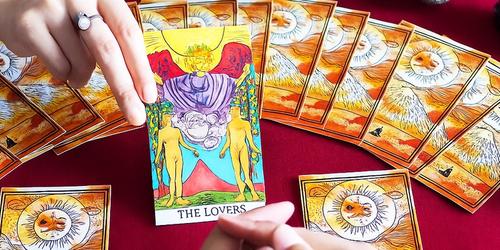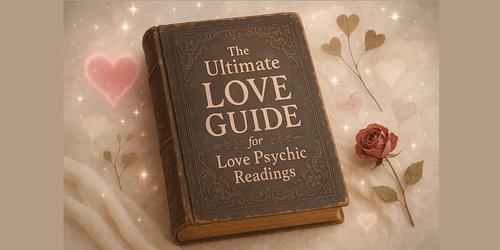
To pay for your reading on your telephone bill, simply call
Instantly message our featured psychics online via psychic messenger.
Click to start
Register now to start your reading online. PSYCHIC MESSENGER- Cheapest psychic service in the UK
- Our readers are available 24/7
- 100% confidential service
- In-depth, concise, personal readings
- Thousands of 5* reviews
Published 24/02/2024 • Updated 19/03/2024 by Joanne Jones
Are Relationship Doubts Normal?
Are relationship doubts normal? Yes, it is totally normal to experience doubt in relationships at various points in a romantic partnership.
Doubts can arise for many reasons, ranging from fear of intimacy or commitment to questioning whether this person is right for your committed relationship.
Regardless of the cause, it is essential to understand that having doubts does not necessarily mean there is something fundamentally wrong with your relationship. So, are relationship doubts normal? Yes, they are, but you should always try to find out why you have doubts and if they are justified doubts or just personal insecurity.
When facing relationship doubts, seeking relationship advice from a relationship coach or expert psychics can be immensely helpful. Many people choose spiritual therapy from live psychic readers to spiritually guide them through the difficult thoughts and feelings that come with relationship doubts.
These professionals have the expertise to help you navigate your concerns and provide guidance on improving your current relationship or making informed decisions about future relationships.
Relationship experts, such as the well-known love psychics at Trusted Psychics or family therapists, can help individuals explore the root causes of their doubts and provide tools to address them. They can assist in identifying patterns from past experiences that may be influencing current feelings of doubt and help individuals develop healthier communication and attachment styles.
Many long-term relationships go through periods of doubt and uncertainty. It is a normal response to doubt or overthink when you care and love someone.
It is important to remember that relationships, like any other aspect of life, have ups and downs. Doubts can be a natural part of the growth and evolution of a healthy relationship.
It is essential to distinguish between healthy doubts and red flags that may be a bad sign of a toxic or unhealthy relationship with deeper issues.
Healthy doubts are often related to personal insecurities or fears, such as fear of commitment or fear of vulnerability. These doubts can be addressed through open and honest communication with your partner, self-reflection, and personal growth.
Are Relationship Doubts Normal?
Feelings of relationship doubts are a normal part of romantic relationships and monogamous relationships. It is essential to seek guidance from professionals who will be able to help navigate these doubts and provide tools for healthy communication and personal growth.
While doubts can be a natural part of a relationship's growth, it is crucial to distinguish between healthy doubts and red flags, like a lack of trust, that may indicate an unhealthy or toxic relationship.
Understanding our attachment style and addressing personal insecurities can contribute to alleviating relationship doubts and fostering a healthy partnership with positive feelings.
Are Relationship Doubts Normal? Navigating Uncertainty in Love
Navigating uncertainty and relationship doubts is an intrinsic part of the complex journey called love.
Doubts can creep in at any time, generally after the honeymoon phase, so it's essential to recognise that they are entirely normal. These doubts often stem from our innate desire for security and assurance in matters of the heart.
Many couples find it challenging how to deal with doubts and uncertainties. Instead of viewing them as threats to the relationship's stability, consider them as opportunities for growth, introspection, and deeper connection.
Understanding Relationship Doubts
When doubts arise, they can be triggered by various factors, including experiences from past relationships, fears of vulnerability, and societal pressures. These doubts reflect our introspective nature and desire for long-lasting, meaningful connections.
Relationship doubts can also arise from the inherent uncertainties of life. Our values, interests, career aspirations, core values or priorities can shift as we evolve and grow. This can lead us to question whether our current relationship aligns with our changing selves.
Understanding why we have these doubts requires introspection and open communication with our partners.
By acknowledging that doubts are a normal part of the relationship journey and addressing their root causes together, couples can build stronger connections and navigate the uncertainties of love more effectively.
Defining Relationship Doubts
Doubts can manifest in various forms, ranging from fleeting concerns to persistent anxieties about the relationship's viability.
Relationship doubts often involve questioning aspects such as one's feelings for a partner, the compatibility between partners, the future of the relationship, or even personal readiness for commitment. They reflect our innate desire for assurance and security in matters of the heart and our innate introspection about the choices we make in love.
Not all doubts are negative; they can serve as valuable indicators of areas needing attention or improvement within a relationship. While some doubts may arise from external factors or past experiences, others might be a natural consequence of the evolving nature of love and individual growth.
The Commonality of Doubts in Love
Are relationship doubts normal? Yes, they are normal and a common theme in most relationships. Doubts in love are remarkably common, affecting individuals in relationships of all kinds and at various stages.
These doubts often emerge from the inherent complexity and vulnerability that love entails. From the early stages of infatuation to long-term commitments, people frequently experience moments of uncertainty if they may be with the wrong person.
These doubts can encompass a wide range of concerns, including questions about compatibility, commitment, trust, or even the sustainability of love over time.
Are Relationship Doubts Normal?
Relationship doubts can serve as opportunities for growth and self-discovery. They prompt individuals to engage in introspection, communication with their partners, and a deeper understanding of their needs and desires.
By acknowledging that doubts are a common aspect of love, couples can approach them with empathy and constructive dialogue, ultimately strengthening their bonds and working through challenges together.
The Spectrum of Relationship Doubts
Are relationship doubts normal? Yes, they are normal, but it's a good idea to identify where on the relationship spectrum they are if they are serious doubts or niggling worries.
The spectrum of relationship doubts is vast and encompasses various uncertainties and concerns individuals can experience in romantic partnerships. These doubts can be categorised into several common themes.
At one end of the spectrum, you might find doubts about compatibility, where individuals question whether they share similar values, interests, or long-term goals with their partners. These doubts can arise when differences are apparent or partners navigate significant life changes.
Towards the other end of the spectrum, you may encounter doubts related to trust and commitment. These doubts can manifest as concerns about loyalty, fidelity, or the depth of emotional connection within the relationship. They often stem from past experiences or insecurities and can be particularly challenging to address.
Signs and Triggers of Relationship Doubts
Signs and triggers of relationship doubts can vary from person to person, but some common indicators and catalysts can help individuals identify when doubts are emerging.
When doubts become chronic and dominate your thoughts, it may indicate underlying concerns that need attention. Doubts can also manifest as an emotional distance from your partner, leading to decreased intimacy, affection, or communication.
If you find yourself withdrawing emotionally or physically from your partner, it could be a sign that doubts are affecting the connection.
Several triggers can activate relationship doubts. Significant transitions or life changes can trigger doubts about compatibility, commitment, and the future.
Past relationship traumas or trust issues can also be powerful triggers for doubts and negative feelings, as they can create a lingering sense of insecurity in new relationships. Recognising these signs and triggers is crucial for individuals and couples to address doubts constructively with honest conversations to nurture a healthy, lasting bond.
Common Signs of Relationship Doubts
It's important to remember that experiencing one or more of these signs doesn't necessarily mean your relationship is doomed. However, addressing these normal doubts through open communication and self-reflection is crucial to maintaining a healthy and fulfilling partnership.
Here are 10 common signs of the biggest relationship doubts:
- Persistent Negative Thoughts: Continually thinking negatively about your partner or the relationship, even when things are going well.
- Emotional Distance: Feeling emotionally distant or detached from your partner, leading to reduced intimacy and communication.
- Increased Arguments: Frequent or escalating arguments and conflicts with your partner, often about unresolved issues or underlying doubts.
- Doubts About Compatibility: Question whether you and your partner are genuinely compatible regarding values, interests, and long-term goals.
- Lack of Trust: Struggling with trust issues, such as suspicions of infidelity or concerns about your partner's honesty.
- Fear of Commitment: Feeling anxious about the prospect of long-term commitment or marriage, often accompanied by concerns about the future.
- Comparing to Others: Frequently compare your relationship to those of others and feel unsatisfied or envious of other couples.
- Withdrawing Emotionally: Becoming emotionally distant or withdrawn from your partner to protect yourself from potential hurt.
- Uncertainty About Feelings: Doubts about your feelings for your partner and whether you truly love or are in love with them.
- Seeking External Validation: Relying on external opinions and seeking validation from friends or family to determine the health or future of your relationship.
Triggers for Relationship Doubts
Various activities or experiences can trigger relationship doubts. Recognising and proactively addressing these triggers with your partner through open communication and empathy can help ease relationship doubts and strengthen your bond.
Here are 10 common triggers for relationship doubts:
- Major Life Transitions: Significant life changes such as moving in together, getting married, having children, or experiencing a career shift can trigger doubts about the future and compatibility.
- Past Relationship Trauma: Unresolved issues or emotional scars from previous relationships can lead to doubts and fears of repeating past mistakes.
- Communication Problems: Difficulty communicating with your partner, leading to misunderstandings and frustrations, can trigger doubts about the relationship's ability to overcome challenges.
- External Influence: Influence from friends, family, or societal expectations can create doubts as you question whether your relationship aligns with others' expectations or norms.
- Infidelity or Betrayal: Discovering or suspecting infidelity, deceit, or betrayal in the relationship can shatter trust and generate significant doubts.
- Insecurity: Personal insecurities, such as low self-esteem or fear of rejection, can lead to doubts about your partner's love and commitment.
- Emotional Distance: Feeling disconnected or emotionally distant from your partner can trigger doubts about the strength of your bond.
- Lack of Intimacy: A decline in physical or emotional intimacy can make you question whether your partner is still interested or committed to the relationship.
- Personal Growth: As individuals grow and change over time, they may reassess whether their partner still aligns with their evolving values, goals, or interests.
- Uncertainty About Future Goals: Differences in long-term goals or aspirations can lead to doubts about whether your relationship can accommodate these differences or if they will lead to conflict.
The Psychological Aspect of Doubts
The psychological aspect of doubts in relationships delves into the complex interplay of intense emotions, cognition, and perception individuals experience when grappling with uncertainties about their romantic partnerships.
These doubts can trigger a cascade of psychological responses, such as anxiety, fear, and self-doubt. The human brain's natural inclination to seek patterns and predict outcomes can exacerbate relationship doubts as individuals attempt to analyse and rationalise their feelings and the potential consequences of their doubts.
Understanding the Psychology of Doubts
Understanding the psychology of doubts in relationships is essential for gaining proper insight into the intricate mechanisms underlying these emotional experiences.
Doubts often emerge from a combination of cognitive, emotional, and social factors. At the cognitive level, individuals may ruminate, replay past events, or worry about future scenarios, which can amplify doubts.
Cognitive biases, like confirmation bias (seeking evidence that supports preexisting doubts) or catastrophising (exaggerating the potential negative outcomes), can further fuel uncertainties. Emotionally, doubts can trigger feelings of anxiety, insecurity, and fear of rejection as individuals grapple with the potential consequences of their doubts about the relationship.
These emotional responses can create a self-perpetuating cycle where doubts intensify, affecting a person's overall mental well-being.
The psychology of doubts in relationships can be deeply influenced by attachment styles developed in childhood and past relationship experiences. People who have anxious attachment styles may be more prone to relationship doubts, as they often fear abandonment and seek constant reassurance from their partners. Those with avoidant attachment styles may distance themselves emotionally when doubts arise, avoiding vulnerability.
The Interplay of Insecurity and Doubt
The interplay of insecurity and doubt in relationships forms a delicate and often challenging dynamic. Insecurity, rooted in feelings of inadequacy or fear of rejection, can be a breeding ground for doubts about one's partner's love and commitment.
These doubts can intensify when individuals project their insecurities onto their relationships, leading to a cycle of self-fulfilling prophecies. On the flip side, relationship doubts can exacerbate feelings of insecurity as individuals question the worthiness of love and whether they deserve a fulfilling partnership.
This interplay highlights the importance of addressing both insecurity and doubt within the context of a relationship, as they can reinforce each other and create barriers to trust, intimacy, and communication.
Exploring Healthy Doubts vs. Unhealthy Doubts
Healthy doubts can be seen as constructive, serving as a means of introspection and growth within a relationship. They arise from a genuine desire to assess and improve the relationship and are often based on rational concerns or a desire for clarity.
Healthy doubts may prompt open and honest communication with one's partner, leading to increased understanding and strengthening the bond. For example, questioning whether your long-term goals align with your partner's and discussing potential compromises is a healthy way to address doubts.
Unhealthy doubts are irrational, persistent, and driven by insecurity, anxiety, or distrust. These doubts can be characterised by excessive worrying, suspicion, or a constant need for reassurance.
Healthy Doubts in Relationships
Healthy doubts in relationships are like the gentle nudge of introspection, helping individuals and couples navigate the complexities of their romantic journey. These doubts often arise from a sincere commitment to the relationship's well-being.
For instance, a healthy doubt might emerge when a couple questions whether their differing long-term goals can be harmonised, or concerns about the quality of communication between partners can lead to doubts that encourage them to seek more effective ways of expressing their emotions and needs.
Healthy doubts prompt individuals to actively engage with their relationships, leading to improved connection and strengthening of the partnership.
Unhealthy Doubts in Relationships
Unhealthy doubts in relationships can be detrimental and emotionally taxing for both individuals involved. These doubts are often irrational and driven by insecurity, anxiety, or distrust rather than legitimate concerns about the relationship.
For example, an individual may constantly doubt their partner's fidelity without evidence or suspicious behaviour. This unhealthy doubt can lead to unwarranted accusations, strained trust, and constant tension within the relationship.
Similarly, unresolved personal issues or past traumas can trigger doubts about one's self-worth and lead to thoughts about whether they deserve their partner's love and affection. These self-esteem-related doubts can manifest as a constant need for reassurance and validation, putting pressure on the partner and creating an emotionally draining atmosphere.
Addressing and Managing Relationship Doubts
Addressing and managing relationship doubts is vital for nurturing a healthy and lasting partnership. Self-awareness is key in addressing relationship doubts. Individuals should reflect on the source of their doubts, whether they stem from personal insecurities, past experiences, or external pressures.
Effective Communication as a Doubt-Resolution Tool
Couples should create a safe and non-judgmental space to openly communicate and share their concerns, fears, and uncertainties with each other. During these discussions, active listening and empathy are crucial to ensure both partners feel heard and validated.
Seeking Support and Guidance
Seeking professional advice, such as couples therapy or individual counselling or seeking spiritual guidance from a psychic reader, can provide valuable tools and insights for managing these doubts effectively.
Love Readings
Love readings with Trusted Psychics can offer a unique and insightful perspective on matters of the heart, providing spiritual therapy for the mind, body, and soul.
These experienced practitioners have honed their intuitive abilities to offer guidance and clarity in the realm of relationships. Love psychics can assist you in identifying the underlying causes of your relationship doubts, whether they stem from past experiences, personal insecurities, or external influences and help you stop overthinking in a relationship.
Their empathetic and non-judgmental approach can help you navigate the complexities of love with a deeper understanding of yourself and your partner.
Whether you choose to have a love reading on Live Messenger or engage in a personal conversation with a live psychic reader over a phone call, the goal remains the same: to find solace, insight, and healing for your relationship concerns.
These spiritual sessions can provide valuable guidance, allowing you to address your doubts constructively and ultimately fostering more fulfilling and harmonious connections in your romantic life.
FAQs
Can Relationship Doubts Go Away?
Are relationship doubts normal, and can they go away? Yes, relationship doubts are normal, and they can certainly go away. Doubts in a relationship are not necessarily permanent, and they often ebb and flow over time.
Overcoming doubts involves understanding their root causes and actively seeking solutions with your partner. Through honest and empathetic discussions, couples can gain clarity, resolve issues, and strengthen their bond, which can lead to doubts dissipating.
Is It Normal to Be Unsure in a Relationship?
Yes, it is normal to feel unsure sometimes in a relationship. Love is an evolving emotion, and uncertainty can arise for various reasons. Personal growth, changing circumstances, external pressures, and past experiences can all contribute to moments of doubt.
How Do I Stop Doubting My Relationship?
Stopping doubts in a relationship involves a combination of self-awareness, effective communication, and personal growth.
It's essential to identify the root causes of your doubts. Are they based on past experiences, personal insecurities, or external pressures? Once you understand the source, communicate openly and honestly with your partner.
Contact the experts at Trusted Psychics to explore your feelings of doubt in your relationship.
How To Contact A Trusted Psychic
Phone a live Psychic 24 hours a day
View all our live phone psychic and tarot readers online.
View All Live readersMessage a live Psychic 24 hours a day:
View all our live messenger psychic and tarot readers online.
launch messengerRecent Articles From the Trusted Psychics Blog

How Can a Psychic Love Reading Help Your Love Life?
Discover how accurate psychic love readings bring clarity, soulmate insights, and healing. Trusted Psychics are available 24/7 for guidance & love insights.

3 of Hearts in a Love Reading and Its Meaning
Discover the meaning of the 3 of Hearts in a love reading. Learn what this card reveals for relationships, soulmates, twin flames, emotional growth & breakups.

Psychic Love Readings: What They Reveal About Your Relationship
Discover with Trusted Psychics what psychic love readings are and what they reveal about your relationships, from new to existing relationships & ex-partners.

What Is a Psychic Love Reading? The Ultimate Love Guide
Explore our ultimate love guide on psychic love readings & how they can help you with finding your twin flame, soulmate, new love, & whether an ex will return.

The Ultimate Guide to Finding Your Soulmate Through Tarot
Here's the ultimate guide to finding your soulmate through Tarot. Find out what The Lovers, 2 of Cups & 4 of Wands Tarot cards mean for finding your soulmate.

7 Soulmate Myths Unveiled Video
In this video, Trusted Psychics breaks down 7 of the biggest soulmate myths that could be blocking real love & your soulmate connection from entering your life.

